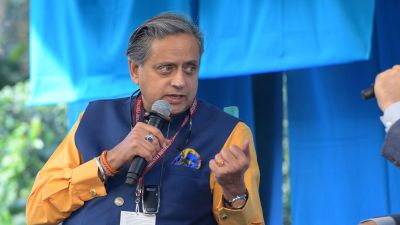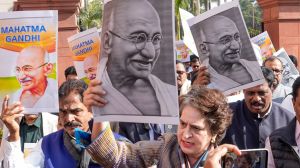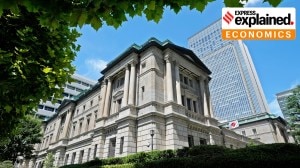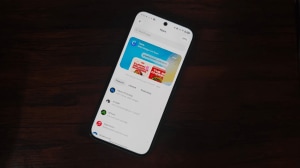The four cases against Donald Trump: Where they stand
Besides the alleged violation of election law in the Stormy Daniels case, Trump faces indictment for alleged election interference in Georgia, for the January 6, 2021 riots, and for taking away classified documents to his home in Florida
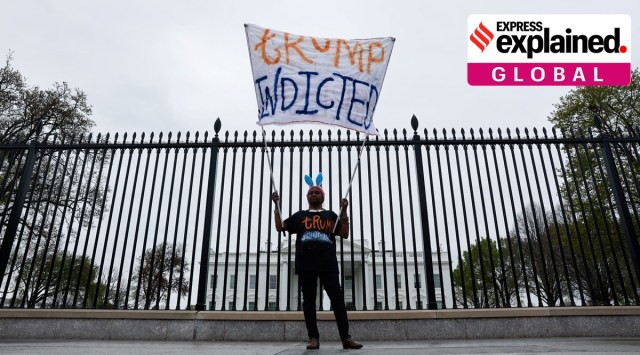 Nadine Seiler holds a "Trump Indicted" sign in front of the White House after former U.S. President Donald Trump's indictment by a Manhattan grand jury following a probe into hush money paid to porn star Stormy Daniels, in Washington, U.S. March 31, 2023. (REUTERS)
Nadine Seiler holds a "Trump Indicted" sign in front of the White House after former U.S. President Donald Trump's indictment by a Manhattan grand jury following a probe into hush money paid to porn star Stormy Daniels, in Washington, U.S. March 31, 2023. (REUTERS) Besides the hush-money case in which he has been indicted by a Manhattan grand jury — and in which he is likely to be arraigned on Tuesday — former President Donald Trump faces indictment in at least three other criminal investigations that are currently ongoing.
Beyond the alleged false accounting for hush money payments to a pornographic film actress who said she had an affair with him, Trump is under investigation by a special counsel in Washington DC for his role in seeking to overturn the result of the 2020 presidential election, and for his potential mishandling of classified documents that travelled to his private residence in Mar-a-Lago, Florida, from the White House. And a special grand jury in Georgia that investigated election interference in the state by Trump and his allies has recommended indictments for multiple people in a report that remains mostly sealed.
No former President has ever confronted the barrage of legal threats that Trump now faces, all of which appear to be heading toward decision points by authorities in coming months. Here is the status of the four criminal investigations against him.
Grand Jury investigation into alleged election interference in Georgia
The Georgia investigation presents two areas of exposure for Trump.
One is his direct involvement in recruiting a slate of alternate presidential electors, even after Georgia’s results were recertified by the state’s Republican leadership.
The other centres on phone calls Trump made to pressure state officials after the election, including one in which he told Brad Raffensperger, Georgia’s secretary of state, that he needed to “find” 11,780 votes — one more than Joe Biden’s margin of victory in the state.
The decision about whether to charge Trump will ultimately be made by Fulton County District Attorney Fani T Willis, who has been investigating the case for the past two years. Willis’s office has said it is considering everything from conspiracy and racketeering to narrower charges, such as criminal solicitation to commit election fraud.
A special grand jury produced a report last month after hearing testimony since last June, but most of the report has been kept secret. A number of legal experts have said Trump faces significant jeopardy in the Georgia inquiry.
Special counsel investigation into alleged attempts to overturn the 2020 election
The Justice Department has been asking questions for more than a year about Trump’s efforts to overturn the election and whether he committed crimes in connection with the January 6, 2021, attack on the United States Capitol.
The investigation — one of two inherited in November by the special counsel, Jack Smith — has used a variety of methods and has gathered an enormous amount of information.
Federal agents have seized cellphones and other devices from pro-Trump lawyers including John Eastman and Jeffrey Clark — as well as from one of Trump’s chief congressional allies, Rep. Scott Perry, R-Pa.
Prosecutors have issued grand jury subpoenas to several state Republican officials and to dozens of Trump administration lawyers and officials. Those include Mark Meadows, Trump’s onetime chief of staff, and former Vice President Mike Pence, who presumably would have knowledge of the former president’s thoughts and behaviour in weeks before January 6.
In the most recent sign the investigation is continuing apace, Smith has issued subpoenas to Trump’s daughter Ivanka and his son-in-law Jared Kushner.
Investigators have also been poring over thousands of pages of interviews conducted by the House select committee investigating January 6, which recommended that Trump be prosecuted for crimes including inciting insurrection, conspiracy to defraud the United States, and obstruction of a proceeding before Congress.
It remains unclear if special counsel Smith will ultimately indict Trump. But several legal experts — including Timothy J. Heaphy, a former U.S. attorney who led the House’s January 6 investigation — have said that the key to bringing charges is obtaining clear-cut evidence that Trump intended to break the law.
Special counsel investigation into the alleged mishandling of classified documents
The investigation into Trump’s handling of classified documents began in earnest in May 2022 with a subpoena. It sought the return of any classified material still in his possession, after he had voluntarily handed over an initial batch of records that turned out to include almost 200 classified documents.
Within a month, a lawyer for Trump, M. Evan Corcoran, gave investigators more than 30 additional documents in response to the subpoena. Around the same time, another lawyer, Christina Bobb, asserted that a “diligent search” had been conducted at Mar-a-Lago, assuring prosecutors there were no more documents with classification markings.
But the inquiry took a dramatic turn in August when acting on a search warrant, the FBI descended on Mar-a-Lago and discovered more than 100 additional classified documents. The affidavit submitted by the Justice Department in seeking the search warrant said that investigators had “probable cause to believe that evidence of obstruction” would be discovered.
Pence and President Joe Biden have also faced scrutiny for having classified materials in their possession — in Biden’s case, a separate special counsel investigation is underway.
In the case of Trump, prosecutors have focused on a few key questions: Did Trump knowingly remove the sensitive records from the White House and did he willfully hold on to them in violation of the Espionage Act? Moreover, did he try to hinder investigators from figuring out why or where he kept them?
Manhattan District Attorney: Hush-money payment to Stormy Daniels
The investigation into Trump’s role in paying hush money to porn actress Stormy Daniels spanned five years, two Manhattan district attorneys and multiple grand juries. Prosecutors under the current district attorney, Alvin Bragg, began presenting evidence to a newly seated grand jury last month.
Details of the case will likely be known at the time of Trump’s arraignment, but the case will likely centre on whether Trump and his company falsified business records to hide the payments to Daniels in the days before the 2016 election.
However, a conviction is not assured. Prosecution of the case would rely on testimony from Michael Cohen, Trump’s former personal lawyer, who made the payment to Daniels and who pleaded guilty himself in 2018 to federal charges.
Trump reimbursed Cohen for the $130,000 he paid out, and according to court papers in Cohen’s case, Trump’s company falsely identified the reimbursements as legal expenses.
In New York, it is a misdemeanour to falsify business records. To make it a felony, prosecutors would need to show that Trump falsified the records to help commit or conceal a second crime — in this case, violating New York state election law, a legal theory that has not been tested.
Trump has denied all wrongdoing and lashed out at prosecutors for leading what he calls a partisan witch hunt against him. He has also denied having an affair with Daniels.
- 01
- 02
- 03
- 04
- 05


